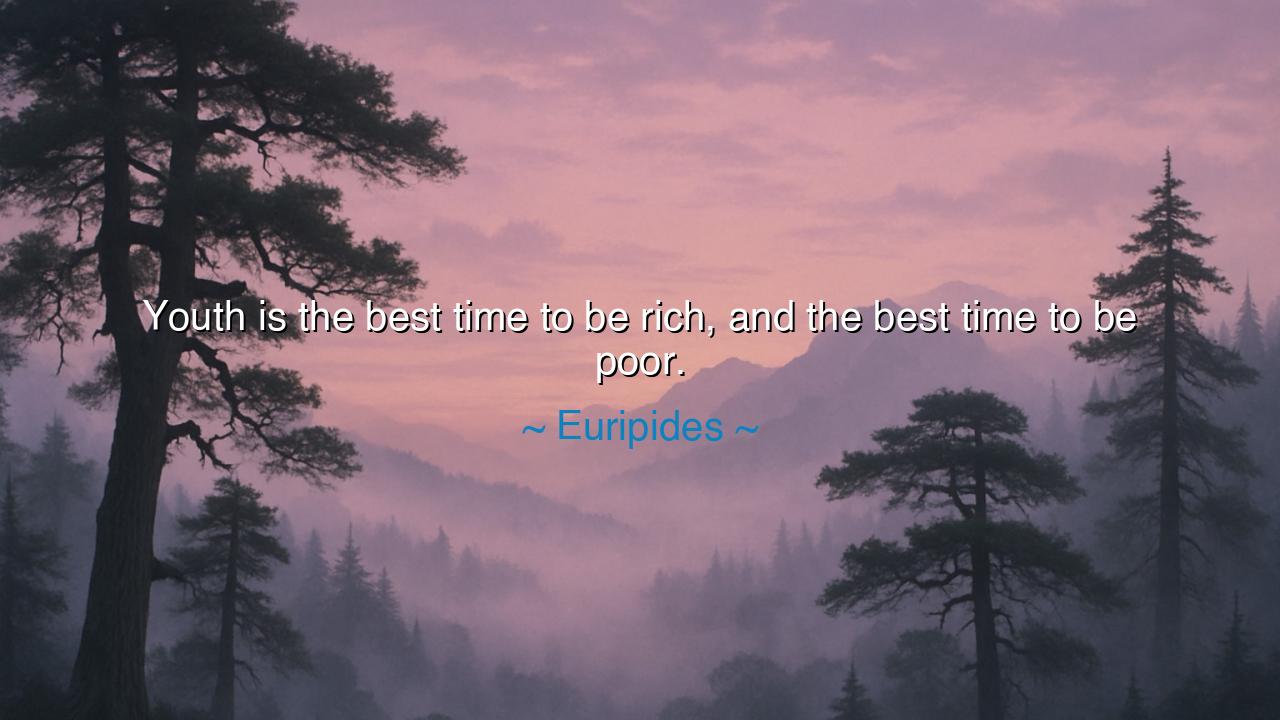
Youth is the best time to be rich, and the best time to be poor.






"Youth is the best time to be rich, and the best time to be poor." These words, spoken by the ancient playwright Euripides, reflect a deep understanding of the human condition and the way the seasons of life shape our experiences. In these few words, he encapsulates the paradox of youth, that age of life in which the forces of ambition, energy, and potential are in full force, but where the burdens of wealth and poverty are experienced differently than at any other time. To be rich in youth is to have the freedom, the power, and the resources to explore life without restriction, but to be poor in youth is to live with the freedom of simplicity, without the weight of material concern. Euripides teaches us that both conditions, wealth and poverty, offer unique opportunities during youth, each fostering a different kind of strength and resilience that will serve us in life.
In youth, the world is open and full of possibilities. The energy of a young person is boundless, and when they are rich, they have the means to pursue their dreams, to experience the world without the constraints that come with the responsibility of older age. Youth is the time to explore, to create, to take risks without the fear of losing what has been built over a lifetime. A young person with wealth has the freedom to experiment with ideas, to travel, to invest in their education, and to forge their own path. The energy of youth coupled with the resources of wealth allows for unbounded growth, as the rich can afford to explore every facet of life with vigor and adventure. It is the time to dream big, for a young soul with riches is unstoppable, propelled by both youth and prosperity.
Consider the life of Alexander the Great, who, though young, was given the wealth of an empire and the opportunity to change the world. His youth was not a barrier to greatness, but rather an advantage, as he had the resources and the ambition to conquer vast territories, from Greece to Egypt, and into Asia. Wealth and youth together created a powerful force that led him to become one of the greatest leaders in history. He could take risks, venture into unknown territories, and build an empire because his youth was paired with the fortune of being born into a wealthy, powerful family. His wealth allowed him to live a life of freedom and adventure, where every challenge could be met with the resources he needed to succeed.
But Euripides also reminds us that poverty in youth is not without its merits. In fact, he suggests that this condition, too, can serve the young well. Youth is the time when the spirit is most flexible and resilient, and when faced with poverty, the young are often forced to be creative, resourceful, and innovative. A young person who is poor does not have the same comforts as the wealthy, but they often possess a deep well of strength and imagination that drives them forward. They learn to navigate the world in ways that wealth cannot provide, building skills and experiences that form the foundation of future success. In a sense, poverty in youth fosters a grit that serves the individual well later in life, when they no longer have the luxury of wealth and must rely on their inner strength and resolve to move forward.
Think of Abraham Lincoln, born into a poor family in the wilderness of Indiana. His youth was marked by hardship and scarcity, but he never allowed these circumstances to define him. His experiences with poverty taught him the value of self-reliance, and it is from this humble beginning that Lincoln rose to become one of the greatest presidents in the history of the United States. His lack of wealth did not stifle his ambition or his drive. Instead, it sharpened his mind and fueled his determination to rise above his humble origins, proving that the struggles of youth can ignite a power that wealth alone cannot provide. His story reminds us that youthful poverty can forge a character that is capable of great accomplishment.
The lesson in Euripides’ words is one of balance. Youth—whether in wealth or poverty—is the time to cultivate strength in whatever circumstance we find ourselves. If we are rich, we must use that wealth wisely, not to indulge in excess, but to foster growth—to explore, to learn, and to prepare for the future. If we are poor, we must not despair, but use our resourcefulness to build the character and the skills that will serve us throughout life. Both wealth and poverty in youth offer unique opportunities, but it is how we respond to these circumstances, how we grow from them, that shapes who we will become.
Therefore, as you walk the path of youth, whether in wealth or poverty, remember that this is your season of growth. It is a time to build the foundations of your character, to explore the world with courage and imagination, and to recognize the strength that lies in both the freedom of wealth and the resilience forged in adversity. Let neither circumstance define you, but instead, use them to propel you toward the future with wisdom and purpose. For in the end, it is not the amount of wealth we accumulate, but the strength of spirit that we cultivate in youth, that determines the richness of our lives.






AAdministratorAdministrator
Welcome, honored guests. Please leave a comment, we will respond soon